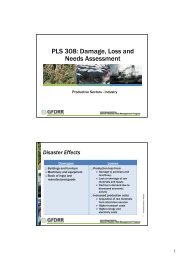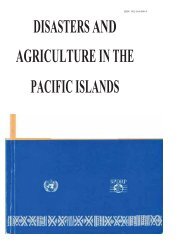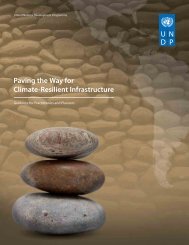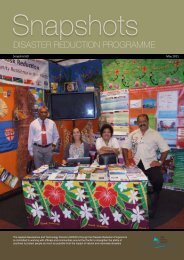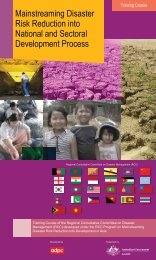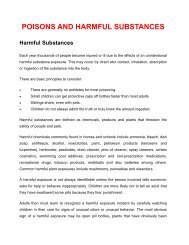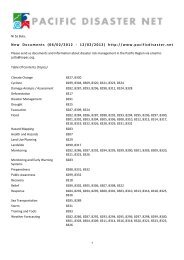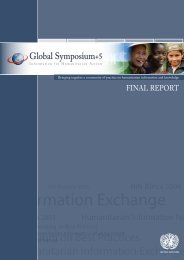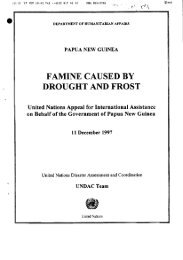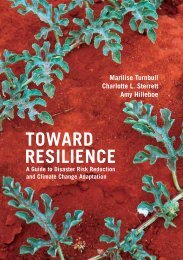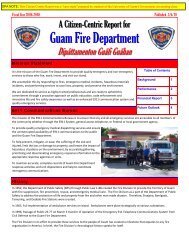A global review of disaster reduction initiatives - Welcome to the ...
A global review of disaster reduction initiatives - Welcome to the ...
A global review of disaster reduction initiatives - Welcome to the ...
Create successful ePaper yourself
Turn your PDF publications into a flip-book with our unique Google optimized e-Paper software.
3Living with Risk: A <strong>global</strong> <strong>review</strong> <strong>of</strong> <strong>disaster</strong> <strong>reduction</strong> <strong>initiatives</strong>110Case: AlgeriaIn November 2001, unusually heavy rain fellin <strong>the</strong> Algerian capital, Algiers. Flash floodsand mudslides swept through many parts <strong>of</strong><strong>the</strong> city, killing more than 800 people. At <strong>the</strong>time it was suggested that <strong>disaster</strong> managementstructures and <strong>the</strong> population were woefullyunprepared for such an event. However,it turned out that several cases <strong>of</strong> human activityand unsuited policies actually may havecontributed <strong>to</strong> <strong>the</strong> severity <strong>of</strong> <strong>the</strong> <strong>disaster</strong>. Due<strong>to</strong> <strong>the</strong> scope <strong>of</strong> <strong>the</strong> <strong>disaster</strong> and its location in<strong>the</strong> centre <strong>of</strong> <strong>the</strong> capital, all levels <strong>of</strong> <strong>the</strong> governmentwere seriously shaken. Senior <strong>of</strong>ficialsexperienced, first-hand, <strong>the</strong> lack <strong>of</strong> coordination<strong>of</strong> <strong>the</strong> various parties concerned with <strong>the</strong>emergency response, as well as having <strong>to</strong> accept<strong>the</strong>ir own failure <strong>of</strong> foresight.Since this <strong>disaster</strong>, <strong>the</strong>re is a new way <strong>of</strong> thinkingabout <strong>disaster</strong> management in Algeria, particularlyin urban areas. This has been demonstratedthrough several <strong>initiatives</strong> that startedonly months after <strong>the</strong> <strong>disaster</strong>. For <strong>the</strong> first timeever, <strong>the</strong> Head <strong>of</strong> State ordered all <strong>the</strong> ministries<strong>to</strong> take serious account <strong>of</strong> <strong>the</strong> notion <strong>of</strong><strong>disaster</strong> <strong>reduction</strong> and include it in <strong>the</strong>ir variousprogrammes. The Prime Minister also discussed<strong>the</strong> matter during <strong>the</strong> Council <strong>of</strong> <strong>the</strong>Government, and called for a permanent coordinatingstructure <strong>of</strong> all <strong>the</strong> ac<strong>to</strong>rs involved in<strong>disaster</strong> management. The Ministry <strong>of</strong> Interioris developing a permanent structure whichwill coordinate all phases <strong>of</strong> <strong>disaster</strong> managementincluding risk <strong>reduction</strong> measures,response and rehabilitation. The GeneralDirec<strong>to</strong>rate <strong>of</strong> Civil Protection is shifting itsattention <strong>to</strong>wards prevention activities. Thecurrent ruling political party in Algiers ispreparing <strong>to</strong> include <strong>disaster</strong> management inits program for a forthcoming legislative electioncampaign. Senior party <strong>of</strong>ficials are solicitingexpert advice from scientific and technicaladvisors in preparing <strong>the</strong>ir programme.Since <strong>the</strong> floods, international organizationshave joined forces <strong>to</strong> help in risk <strong>reduction</strong> projects.The Mayor <strong>of</strong> Paris paid a visit <strong>to</strong> <strong>the</strong>affected areas and signed a memorandum <strong>of</strong>cooperation between <strong>the</strong> Wilaya (province) <strong>of</strong>Algiers and <strong>the</strong> Atelier Parisien d’Urbanisme for aprogramme <strong>to</strong> promote better urban planningin Algiers. In early 2002, ano<strong>the</strong>r Frenchorganization, Architecture-Urgence, signed aconvention for cooperation with <strong>the</strong> Wilaya <strong>of</strong>Algiers <strong>to</strong> work on urban planning <strong>to</strong> reduce<strong>disaster</strong>s.The UN <strong>of</strong>fice in Algiers also installed a commission<strong>to</strong> work on <strong>disaster</strong> <strong>reduction</strong> in Algeriaand engaged an Italian specialist <strong>to</strong> discuss<strong>the</strong> matter with Algerian authorities.UN- HABITAT proposed a cooperation projectin <strong>disaster</strong> <strong>reduction</strong> with <strong>the</strong> Algerian government.A World Bank delegation has similarlyvisited Algeria <strong>to</strong> discuss a long-termproject in <strong>disaster</strong> risk management. An expertin urban planning from USAID visitedAlgiers less than a month after <strong>the</strong> <strong>disaster</strong> <strong>to</strong>discuss eventual cooperation in <strong>disaster</strong> <strong>reduction</strong>in urban areas with many Algerian institutions.USAID has expressed an interest inpreparing a project proposal for that purpose.Within <strong>the</strong> first six months after <strong>the</strong> <strong>disaster</strong>,several seminars or conferences related <strong>to</strong> <strong>disaster</strong><strong>reduction</strong> were ei<strong>the</strong>r held or being planned.An Algerian-French colloquium on sustainabledevelopment and <strong>disaster</strong> <strong>reduction</strong> <strong>to</strong>ok placein Algiers only weeks after <strong>the</strong> <strong>disaster</strong>. Similarcolloquia are planned for o<strong>the</strong>r regions <strong>of</strong> <strong>the</strong>country. All <strong>of</strong> <strong>the</strong>se actions demonstrate thatAlgerian authorities at all levels are more aware<strong>to</strong>day about <strong>the</strong> risks <strong>the</strong>y face.Case: KazakhstanThe Republic <strong>of</strong> Kazakhstan <strong>of</strong>ten experiencesearthquakes, floods, landslides, and coastalfloods. Only recently has <strong>the</strong> importance <strong>of</strong>natural <strong>disaster</strong> <strong>reduction</strong> been recognized. InMay 2000, Kazakhstan’s Emergency SituationAgency published <strong>the</strong> Plan <strong>of</strong> Preparedness <strong>of</strong>Kazakhstan for Natural Disasters with <strong>the</strong>cooperation <strong>of</strong> <strong>the</strong> National Red Cross andRed Crescent Society and UNDP. The introduction<strong>of</strong> <strong>the</strong> plan cites <strong>the</strong> considerable financiallosses incurred by <strong>the</strong> country because <strong>of</strong><strong>disaster</strong>s and urges all organizations <strong>to</strong> takeproper action <strong>to</strong> reduce <strong>the</strong>ir negative impac<strong>to</strong>n <strong>the</strong> country’s development. The report providesguidance on preparedness activities for<strong>disaster</strong> <strong>reduction</strong>, response scenarios for <strong>disaster</strong>s,legislation for efficient mobilization <strong>of</strong>organizations concerned, and implementation<strong>of</strong> different measures that can be deployedagainst various risks.



